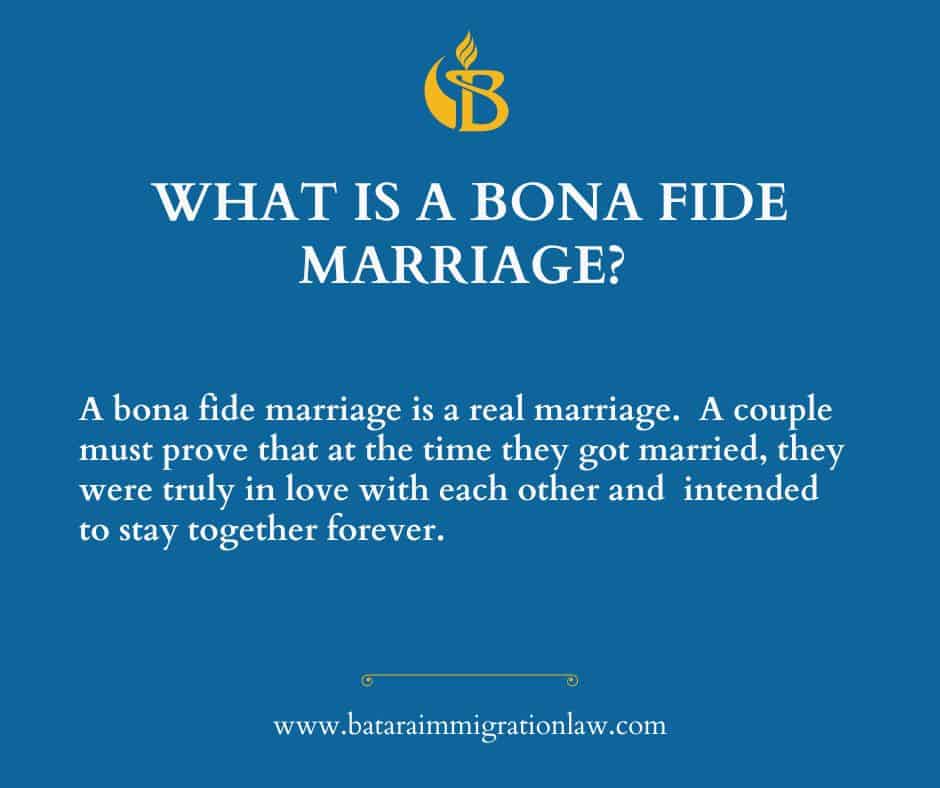
Hoping to spend their lives together, couples file an I-130 petition to begin the green card process. Unfortunately, some fail to prove they have a legitimate bona fide marriage and their petition is denied. To help couples avoid such nightmares, this article shares (a) how the I-130 denial process works, (b) what causes officers to challenge marriage petitions, and (c) how to overcome I-130 denials.
Want to win a green card for your wife or husband?
Sure, you do.
Then first things first.
Put in the time and effort necessary for immigration success.
Put in the time and effort necessary to ensure the I-130 visa petition for your spouse passes government review.
Whether you’ve been married for 10 days, 10 months, or 10 years.

What Are The Consequences Of Failing To Prove A Bona Fide Marriage?
There are two steps to the permanent resident process.
Step one is the filing of an I-130 immigrant relative petition. Its approval enables petitioners to advance forward to the second step and apply for permanent resident status.
Unfortunately, many immigrants who seek a marriage-based green card discount the first step of the process. They perceive filing the spousal I-130 petition as a trivial requirement due to its limited set of questions.
They do not give this critical step the attention it deserves. There are various green card marriage mistakes that, with proper preparation, should never occur.
Beneath the form’s modesty lies a subtle complexity: proving your marriage is not only legal but also authentic.
A marriage certificate, alone, is not enough.
In other words, you must demonstrate your union is based on a bona fide relationship.
If you fall short, the I-130 petition will be denied. Worse, your spouse may wind up in removal proceedings facing deportation charges.
Your dream of a life together is transformed into a battle against permanent separation.
How The I-130 Denial Process Works
When USCIS plans to deny an I-130 spousal petition, the final decision is not instant.
Rather, the government issues a Notice Of Intent To Deny (NOID). This provides the U.S. citizen spouse an opportunity to respond before a final decision is rendered.
In the NOID, the government lays out their concerns why they cannot approve the petition. The rely is due in 30 days.
In some cases, the couple is scheduled for a special interview, called a Stokes interview, in which they are usually separated and asked questions about the same lack of evidence and other matters independently,
Yet, in my experience as an USCIS appeals lawyer, over 1/2 of the cases I see involve couples who did not address the shortcomings within this time frame.
So what happens?
USCIS issues its formal decision to deny the I-130 petition. For the same reasons noted in the NOID.
At this point, the couple has to make an excruciating choice. Challenge the denial of the I-130 or start over with a new petition.
The government’s basis for denial sometimes limits the couple’s options. For instance, if the decision alleges a previous act of marriage fraud, an appeal is the only door open.
Of course, couples could choose to do nothing. In all cases, except for a few highly rare set of circumstances, that is the worst alternative.
On the other hand, it is almost always crucial to set the record straight. Especially in cases that might lead to a Notice To Appear (NTA) at immigration court.
Whether you win or lose, you should make the effort to clarify your position. You should provide the missing evidence which compels a contrary result.
This will benefit your later efforts. Whether it is at an agency interview after submission of a new I-130 spousal petition. Or after you have received an NTA to face removal charges.
Smart case planning dictates that you go on the offensive with evidence of your bona fide marriage even when you are in a defensive position.
Four Reasons Why USCIS Issues A Notice Of Intent To Deny I-130 Spousal Petitions
Government denials of I-130 spousal petitions fall into four general categories.
- Insufficient evidence of a bona fide marriage
- Inconsistent answers given by the couple at their interview
- Incompatible information obtained by the government
- Injurious findings from the immigrant’s earlier marriage
Each issue presents different problems.
However, at the core, each of the four reasons relate to the government’s fears of sham relationships – a belief that an immigrant’s marriage is not a bona fide marriage.
Let’s dive in and take a closer look.
1. Insufficient Evidence Of A
Bona Fide Relationship
The foremost stumbling block for couples who file an I-130 spousal petition is evidence.
Sounds strange, doesn’t it?
After all, every I-130 applicant should understand the significance of ample supporting materials.
The government does.
Here is a simple way to grasp why government agencies insist on strong evidence of a true marriage.
Once USCIS approves the I-130 petition, the immigrant is only a step away from lawful permanent resident status. They want to feel confident those who win green cards deserve them.
In other words, they want to make sure that couples have a bona fide marriage.
Seems rather obvious.
Some couples are eligible to adjust status combine their I-130 petitions with green card applications in a single filing.
Many still fall short due to insufficient proof.
Consider two decorated professionals who recently consulted with me. Even though they live together, they function independently.
The immigrant was a successful businessman in his home country. He brought sizeable assets to the marriage. He maintains full control of them. He does not want to open joint bank accounts or lines of credit until the marriage passes the five year mark.
The U.S. spouse is an accomplished professional. Her skills are in demand throughout the country. She often travels from coast to coast. She owns the home they live in as separate property.
They do not have joint health, disability, automobile, life, or home insurance. They pay via separate bank accounts for their meals, clothes, and cars. They have no plans for children.
It is quite likely their marriage may not seem genuine to an examiner.
Because officers look for evidence of joint ownership and commingling of assets, I advised them to anticipate extended questioning at their upcoming interview. Inquiries into many aspects of their courtship, day-to-day activities, and future goals is not uncommon in such relationships.
As they left my office, I knew that unless they prepared ahead of time, they ran a high risk of incurring an I-130 spousal petition denial.
2. Inconsistent Answers Given By Couples
This happens in a variety of situations. In some, the couple relied on a legal assistant or paralegal to help prepare their petition. Other times they hired a lawyer or filled out their own paperwork.
But they were never prepared for the actual interview. They attend their interview without any clue about possible questions.
They get tripped up with simple inquiries.
I met one couple who gave different answers about a small birthday celebration.
“What type of cake did your husband buy you for your more recent birthday?”, the officer asked.
The wife said it was chocolate. The husband said it was vanilla.
A follow-up question asked, “Where was the cake purchased?”
The wife said Store A. The husband said Store B.
To the interviewer, the disparities were potential fraud indicators.
The reality was that the cake was a chocolate and vanilla marble cake.
The wife did not know where her husband bought the cake. It was a wild guess. She did not bother to explain her uncertainty to the USCIS examiner.
Had the couple been properly prepared, they would have known such types of questions are not unusual.
Moreover, they would been cautioned about the danger of blurting answers out without thinking in advance.
They would have understood that such a lackadaisical approach to preparation increased the odds their relationship would not be viewed as a genuine bona fide marriage.

3. Incompatible Information Obtained
By The Government
The government has many means of obtaining information about couples. Lately, social media has become a primary source of research by immigration examiners.
Irresponsible behavior on sites like Facebook and Instagram leads to havoc for couples at I-130 marriage interviews.
Complications are sometimes due to the recklessness of a husband. Other times, the wife. Often, both.
Here are a few ways your actions on social media create a negative view about the authenticity of your marriage
- Personal Data: Some individuals, after marriage, deliberately leave “single” on their account information.
- Photographs: A U.S. citizen petitioner posts many pictures. Very few show her current husband.
- Live Videos: The immigrant enjoys sharing live videos, captured at the moment. None show his American wife. But many show him with other women having a good time at night club.
The items shared might be several years old. The photographs and videos may reflect past relationships. They might be of close family members and relatives.
Nonetheless, to an officer, they are signals of potential marriage fraud.
They undercut the validity of evidence submitted to prove a bona fide marriage.
These types of thoughtless postings can provoke the rejection of spousal I-130 petitions.
4. Injurious Findings From The
Immigrant’s Earlier Marriage
Another problem arises for some immigrants who were married before.
Their ex-spouse filed an I-130 immigrant relative petition for them. But it was not approved based on suspicion of marriage fraud.
In such cases, future visa petitions for that immigrant are forever barred. Unless the U.S. spouse can overcome a heavy evidentiary burden.
Nothing less than proving the immigrant’s previous marriage was legitimate will do.
Since many divorced couples no longer communicate with each other, this challenge is sometimes insurmountable.
How does an authentic marriage run into such trouble?
These situations often occur when couples start to experience marital discord after the filing of the I-130 petition but before its approval.
Here is an example.
They are thinking about breaking up and living apart. Yet, neither spouse is convinced their differences cannot be worked out.
On the day of the interview, the two individuals are angry at each other. They are upset.
The petitioner-spouse does not want to attend. But given the importance of their interview, she decides to show up with her estranged immigrant husband.
As a general rule, prudence dictates that quarreling couples, still married, should not attend their green card interview. until they have resolved their animosities.
Instead, they proceed forward.
They bicker. They argue.
Their interview is called. The officer senses the tension. He asks, “Do you want to go through with this?” The U.S. spouse says, “No.”
She adds, “I want to withdraw my petition. We don’t have a real marriage.”
The interviewing agent is more than willing to oblige. The spouse signs a form to withdraw her I-130 visa petition.
She did mean that the marriage was fraudulent. She was referring to their ability to get along as a couple. The nuance is not addressed.
A few weeks later, she regrets her actions. It is too late. The USCIS decision states the couple did not prove the marriage was a bona fide marriage. In the agency’s view, the green card application was an effort to circumvent immigration law.
The petitioner does not file an appeal. The immigrant does not file a motion to reopen and reconsider the decision.
Several years afterward, a new wife files a spousal I-130 petition.
The government states the current relationship appears legitimate. Still, based on the earlier USCIS determination, the government issues an I-130 denial.
Do Not Allow USCIS I-130 Denials To Destroy Your Bona Fide Marriage
A larger number of I-130 spousal petition denials are being issued than ever before. I have met several couples whose dreams of a life together are on the verge of disaster.
Of course, the current administration’s anti-immigration agenda is part of the cause.
But many couples are willing accomplices.
Most denials have common shortcomings: careless planning and shoddy preparation.
Too often, couples fail to put in the time and effort required for green card success.
They assume marriage certificates are enough to prove a bona fide matrimony.
And when they receive a Notice Of Intent To Deny, they ignore the request for more evidence.
Be different. Be responsible.
If you reply to the NOID and lose, do not give up and walk away. Decide your next steps.
Refile or appeal.
It is not in your best interests to allow an adverse decision to go unanswered.
Regardless of the allegations, an I-130 denial is a challenge to your life together.
You must fight back.
Ready to take a serious and honest look at the strengths and weaknesses of your immigration case? Let’s get started with a personalized strategy and planning consultation . . .




